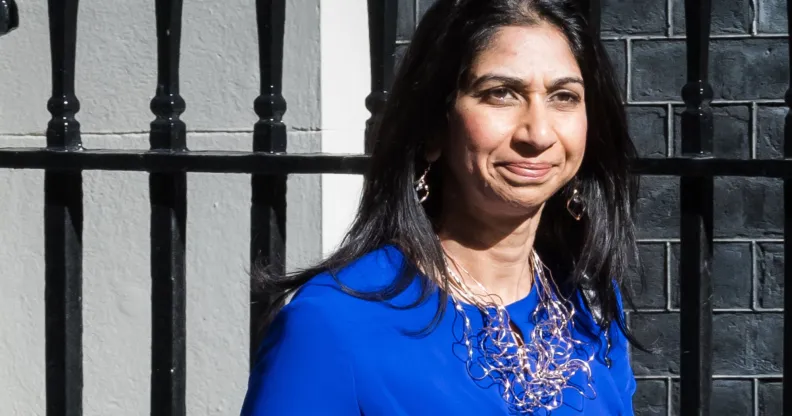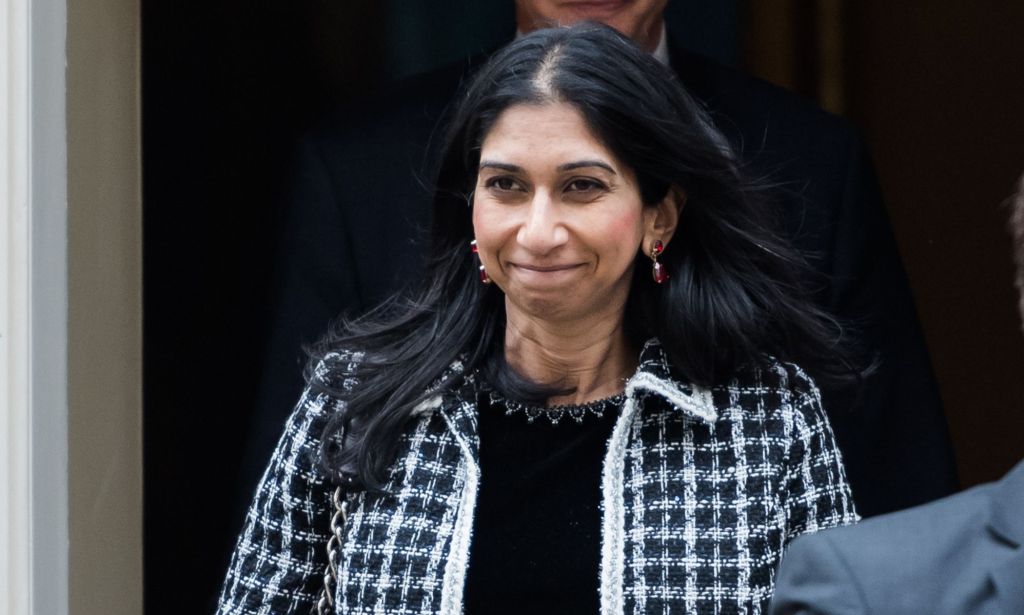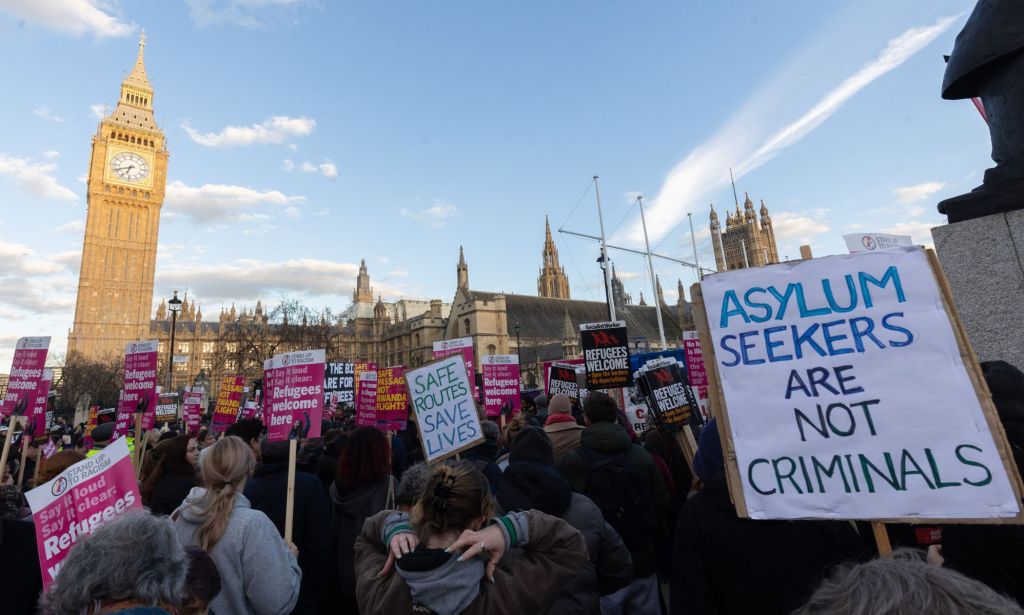UK’s refusal to help Sudan refugees is no surprise given treatment of LGBTQ+ Sudanese people

(Getty)
The UK is refusing to create a safe route for people fleeing Sudan – just as it has previously failed to create a resettlement scheme for LGBTQ+ people fleeing persecution in the country.
Hundreds have died and thousands have been displaced amid a burgeoning civil war between Sudan’s army and the country’s main paramilitary force. While the UK has worked to extract British diplomats and passport-holders from the country, it is not currently offering any new resettlement scheme for Sudanese displaced people.
Instead of offering support, Suella Braverman has said there’s “no good reason” for people fleeing Sudan to come to the UK via the Channel.
Braverman was asked by Sky News on Wednesday (26 April) what would happen to those who turned up in Dover via a small boat having fled Sudan.
“We are passing a new law at the moment to deal with people who come here illegally,” Braverman said. “There is no good reason for anybody to get into a small boat and cross the Channel in search of a life in the UK.”
Labour MP Nadia Whittome is among those urging the government to help those fleeing Sudan. She told PinkNews: “The humanitarian situation in Sudan is desperate, but for those who want to join family and friends in the UK, there are no safe routes to get here. Upon their arrival after a harrowing journey, Sudanese refugees face being criminalised and deported by our Conservative government.
“We should show compassion to people escaping war and open safe routes for those fleeing Sudan. The government must also scrap the Illegal Migration Bill, the Rwanda Scheme and the Nationality and Borders Act so that refugees from around the world have a chance to rebuild their lives in the UK.”
Sebastian Rocca, founder and CEO of LGBTQ+ asylum seeker and refugee support group Micro Rainbow, told PinkNews that Braverman’s remarks “demonstrate a deliberate attempt to ignore the very reasons why people become refugees in the first place”.
“No one leaves their country and makes perilous journeys to find safety unless under extreme provocation,” Rocca said.
“Often that provocation might be the eruption of violent conflict, or, in the case of the Sudanese asylum seekers Micro Rainbow works with, it is because of the harassment, violence and persecution they face because of who they are or who they love.”
LGBTQ asylum seekers have fled Sudan because of violence and persecution
Micro Rainbow has previously supported LGBTQ+ people from Sudan, who have experienced immense discrimination, abuse and violence, in finding asylum. The country criminalises same-sex sexual activity, and sentences include a maximum penalty of life imprisonment.
Rocca explained: “In normal circumstances living in Sudan as a queer person could cost one’s life.
“The conflict adds a new layer of hardship, danger and urgency to anyone and especially those minorities who are normally persecuted.”
Another charity, Rainbow Migration, has also supported LGBTQ+ people from Sudan prior to the current conflict.

Executive director Leila Zadeh said Sudan is “not a safe place” for LGBTQ+ people, noting that the UK government’s “own country policy guidance on sexual orientation and gender identity in Sudan stating that LGBTI people are at risk of serious harm, including life imprisonment”.
“In fact, we have supported LGBTQI+ people from Sudan and around five people were granted asylum in 2020 on the basis of their sexual orientation,” Zadeh said.
“However, there are currently no resettlement scheme for members of the LGBTQI+ community in Sudan, which means that there’s a lack of safe routes for them to find safety in the UK.”
The UK considers asylum claims from people persecuted for being LGBTQ+, but under the Tories’ plans people must arrive via an approved route. Already, applicants are forced to prove their identity, and are routinely met with disbelief and discrimination while in the system
The UK government has been steadfast in its resistance to receive and provide asylum to people
According to government data published in February, the UK offered protection to 23,841 people seeking asylum, including dependents, in 2022.
Of these, 16,649 were granted refugee permission following an asylum application, and 5,792 people were resettled to the UK through resettlement schemes.
Around 2,909 Sudanese people applied for asylum in the UK in 2022. The government said the grant rate – the proportion of initial decisions which resulted in a grant of protection or other leave – for applicants from Sudan last year sat at around 84 per cent.
However, the government is increasingly clamping down on those who arrive via routes it deems “illegal”, such as those who risk their lives in small boat crossings.
Over 25,000 adults and children who crossed the Channel in 2022 would be recognised as refugees if the UK government processed their asylum applications, according to a report by the Refugee Council.

Approximately four in 10 who crossed the Channel came from just five countries – Sudan, Afghanistan, Iran, Syria and Eritrea.
In 2022, the UK only resettled approximately 1,200 individuals under UNHCR resettlement schemes – which Braverman told Sky News “are the right mechanism” for those fleeing Sudan.
Under the 1951 UN Convention Relating to the Status of Refugees, anyone fleeing war, persecution, discrimination or conflict has the right to claim asylum on the soil of a signatory to the convention. The UK is a signatory.
The UK government has introduced a new immigration bill which would prevent those arriving via routes deemed illegal from claiming asylum. They would instead be removed to a third country such as Rwanda, which has signed a deal with the UK to facilitate this.
The reviled scheme was the brainchild of Priti Patel, but her successor Suella Braverman has pushed it relentlessly despite legal challenges and outrage from human rights advocates.
Zadeh said the bill, which is back in parliament, could see Sudanese “most likely detained”, which would be particularly harmful for those who are LGBTQ+.
“In immigration detention, LGBTQI+ people face bullying, harassment and abuse with serious consequences for their mental health,” she said
“And they could then be sent to countries that are also unsafe for LGBTQI+ people and where they have no connection or community, like Rwanda, where LGBTQI+ people are subjected to discrimination, violence and abuse.”
“People shouldn’t be punished for the way they come here to find safety, instead they should be protected and supported to rebuild their lives.”
How did this story make you feel?

